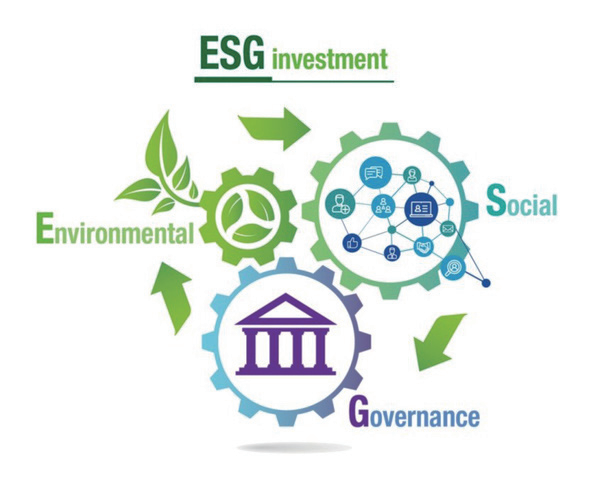ST examined the ESG (Environmental, Social, and Governance) type of management, which has recently emerged as a global management trend. Let’s find out why ESG, which is spreading throughout many industries, has become a hot topic. ............Ed.
The world is closely watching ‘ESG management.’ This ‘ESG pandemic’ started last year with a warning from Larry Fink, Chairman and CEO of BlackRock, the largest operator of the ETF (Exchange Traded Fund). He said, “In the future, we will not invest in companies with more than 25% of fossil fuel sales in the corporation’s sales, using three environmental, social, and governance standards.” Following this trend, the top 100 companies in the UK are about to employ ESG standards when setting their management salary targets, and the KEF (Korea Enterprises Federation) decided to establish a new ESG management committee.
As the COVID-19 crisis persists, enterprises that have adapted well to the changing environment and showed highquality social responsibility are also showing improved performance in terms of return on investment. Thus, there was a perception that companies with good ESG scores have better viability. For this reason, more and more corporations are jumping into the concept of ESG management. If you search ‘ESG management’ on the Internet portal sites, each enterprise is scrambling to promote and emphasize their ‘ESG management.’
Then, what is ESG management? ESG management comes from the ESG philosophy, which stands for Environment, Social, and Governance. This means that companies can achieve sustainable development only when they consider transparent management, such as eco-friendliness, social responsibility, and improved governance. Specifically, ESG management refers to management activities in which companies take the lead in protecting the environment, provide social contribution activities, such as support for the socially disadvantaged, and thoroughly comply with laws and ethical standards.
Since March 2021, Europe has begun implementing an SFDR (Sustainable Financial Disclosure Regulation) that mandates financial institutions to disclose sustainability information about investments or products. SFDR obliges financial institutions to disclose sustainability information when disclosing investments and financial products. It shows how financial companies and issuers distributed capital, and will transparently disclose how much funds they invest in ESG and other sustainable activities. European investors will ask Korean companies and issuing institutions to provide more transparent information in the future. Due to this development, Korea will also make ESG disclosures mandatory in different phases starting in 2025.
What type of ‘ESG management’ is currently being implemented in Korean companies?

Many companies are preparing measures to protect the ‘environment.’ Samsung Electronics is strengthening its use of recycled plastics. It is said to have used 220,000 tons of recycled plastic in the last 10 years, from 2009 to 2018. It will further strengthen the use of eco-friendly materials, such as using paper instead of vinyl, in packaging. Non-manufacturing businesses are also carrying out ESG management. Naver is one of them and it is planning to increase carbon absorption and negate actual emissions. The key is the eco-friendly operation of the data center. The Naver Data Center is a building that uses 0.02% of Korea’s total electricity consumption as of the end of 2016, and power consumption is expected to increase further. In response, Naver aims to overcome this problem by reducing energy consumption by use of such method as utilizing cooling systems that rely on natural winds and self-production of highefficiency energy servers. Various ideas have been presented, including the use of waste heat from servers used in heating and road de-icing. Furthermore, other companies like LG, POSCO, and LOTTE are interested in addressing environmental issues.
Beyond environmental issues, ‘social’ and ‘governance’ are no less important. As can be seen in the cases of Namyang Dairy Overuse and Korean Air Peanut Return, boycotts can occur when human rights or social problems are concerned, and stock prices point to a recession, causing damage to the companies involved. Since the influence of SNS has grown more rapidly than in the past, crises spread fast, taking a heavy toll on a company’s corporate image. As a result, many companies have been attending to such social problems, delivering lunch boxes to vulnerable seniors and supporting artificial intelligence speakers. To maintain the diversity of executive and board members, the number of high-ranking female executives has been increased, and other countries have started striving to secure racial diversity.
However, in this country, there is still no precise criteria on the evaluation of ESG. Globally, there are the Dow Jones Sustainability Index and Morgan Stanley Capital International’s finance and governance, human rights, equality between men and women, such as social values, and assessment of eco-friendliness. Therefore, though we have our feet in the international trends in the case of companies that apply ESG Management, the practice is being evaluated in different ways. By 2025, we should come up with mandatory assessment methods as quickly as the official announcement. Currently, overseas competition is stiff, so any indication of improvement must be pushed.
Investors have recognized that companies that care about ESG have better and prolonged financial and economic outcome, and pay more attention to how their investment can have a positive influence. ESG is now a ‘New Normal’ in investment ventures, and this situation will continue. Countries will cooperate on environmental and social issues, and tightened ESG regulations are anticipated to further impact more industries, including finance. Companies should step up to the plate, and take social responsibility in the future. We are living in uncertain times, but the future is still full of possibilities. It will become an opportunity for corporations to focus and actively resolve ESG issues.
Lee Ga-eun (News Editor)
nameun33@soongsil.ac.kr
Kim Tae-eun (ST Cub-Reporter)
rhfelddl01@soongsil.ac.kr


